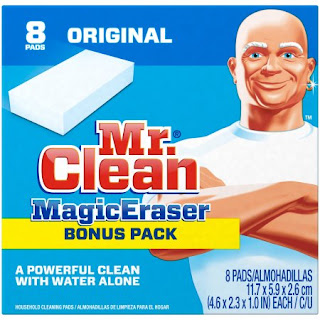The Laura Ingalls Wilder Medal and the Magic Eraser
 |
There is this idea that, as we move towards a more perfect society, that we should constantly tidy up behind ourselves. Whatever we have left behind that embarrasses us in the least should be cleaned up, replaced with something innocuous, or - worse - something that is concocted from the values of the day (this societal Playdoh can be flattened and remolded as we continue our "progress."). And yet, we lose so much when we destroy the old and replace it with the new. We lose context, we lose history, we lose a record of the progression of thought and that movement - much like our stock market - does not always trend upwards. Eugenics, carpet bombing, identity politics, a culture of victimhood, and much else tell us that sometimes we need to see what we fashioned before to see where we went wrong and do a bit of reorienting. Maybe we shouldn't kill the disabled, maybe the biggest boom isn't the best, maybe people are individuals and not just the sum of their adjectives, and maybe the victim is actually not.
People look at Jesus and want to confront Him about slavery or women's rights or any other pet topic. They want to apply some gnostic truth to say He was gay or a communist or married or whatever we can imagine. Erased are the marks left by tradition that tell us with some specificity who He is because such "opinions" from the cult of saints are every so inconvenient.
So it is with Laura Ingalls Wilder (full disclosure: a relative) that we take our judicial time machine and drop it in the fields of Kansas. We judge her not by the reasonable person standards of her time, but by the contradictory ideologies of today. Guilty is the verdict and the sentence is the Magic Eraser. And, just so we don't have to put petrol in the time machine again, we won't name the award after someone else we'd have to character assassinate later. We can go with the flat and forgettable "Children's Literature Legacy Award." Very little will be left of the great people who molded our society as we look for failings, find them, and then use them as a wedge to destroy their memories. "For all have sinned and fall short of the glory of God" is not a prohibition against honoring those who at least strove for something more. It's a justification for our very existence and a value placed on those who took it upon themselves to even try.
(LA Times) - The Laura Ingalls Wilder Medal, a significant achievement award in children’s literature presented by a division of the American Library Assn., will be renamed because of the author’s "stereotypical attitudes" toward Native Americans and African Americans.
The Assn. for Library Service to Children, a division of the American Library Assn., voted Saturday that the Laura Ingalls Wilder Medal, named for the author of "Little House on the Prairie," will now be known as the Children's Literature Legacy Award.
The group explained the decision in a statement on its website: "This decision was made in consideration of the fact that Wilder’s legacy, as represented by her body of work, includes expressions of stereotypical attitudes inconsistent with ALSC’s core values of inclusiveness, integrity and respect, and responsiveness."
The newly renamed Children's Literature Legacy Award was first awarded in 1954 to Wilder. Past winners have included E.B. White, Beverly Cleary, Maurice Sendak and, most recently, Jacqueline Woodson.
Criticism of Wilder's attitudes toward people of color has spanned decades. The Washington Post reports that in 1952, a reader of "Little House on the Prairie" noted that the book describes the American West as a place where "there were no people. Only Indians lived there."
Despite that, Wilder's "Little House" books have remained cultural mainstays ever since their original publication in the 1930s and 1940s. The series inspired a long-running television show starring Michael Landon and Melissa Gilbert, which has long been run in syndication.
In a May report by an association task force, the organization acknowledged that Wilder's books "hold a significant place in the history of children’s literature and continue to be read today" and "are a product of her life, experience and perspective as an individual White woman of her era."
However, the group noted, "changing the name of the award, or ending the award and establishing a new award, does not prohibit access to Wilder’s works or suppress discussion about them. Neither option asks or demands that anyone stop reading Wilder’s books, talking about them, or making them available to children."
Wilder was the subject of a 2017 biography, "Prairie Fires," by Caroline Fraser. The book was published to positive reviews, and won both the Pulitzer Prize for Biography and the National Book Critics Circle Award for Biography.
In an opinion piece for the Washington Post, written in March, shortly after the organization announced it was considering renaming the award, Fraser argued that Wilder's "work and its reception are more complicated than we may once have believed, shedding light on the myths that white Americans have woven about the past."
"There’s nothing wrong with changing the name of an award," Fraser wrote. "Chagrin, however, can be short-lived, and gatekeepers like the ALA should encourage children to read all our provocative classics —critically. I’d like to think that what would matter to Wilder in this debate would be not the institutionalized glory of an award bearing her name but the needs of children."

This week, no fear.
ReplyDeleteNext week?
“changing the name of the award, or ending the award and establishing a new award, does not prohibit access to Wilder’s works or suppress discussion about them. ”
This Fraser woman's notion that expunging Wilder's name would not matter to her is even more stupid than the sanitizing of the award itself.
ReplyDelete